Philip Seymour Hoffman’s 15 Best Roles
- Oops!Something went wrong.Please try again later.
- Oops!Something went wrong.Please try again later.
The post Philip Seymour Hoffman’s 15 Best Roles appeared first on Consequence.
The passing of a talent like Philip Seymour Hoffman is always a hard experience. It’s not just thoughts of the people they’ve left behind that prove haunting, but the knowledge that more from them might have been possible, in a different (better) world. Over the course of his career, though, Hoffman still delivered an incredible range of performances, playing heroes, villains, tragic figures, wise mentors, and complicated celebrities — and he did so across a wide spectrum of film, from the biggest blockbusters of the time to tiny independent films given a wider audience thanks to his presence.
“The only true currency in this bankrupt world is what you share with someone else when you’re uncool.”
It’s been ten years since Hoffman’s death on February 2nd, 2014, but his legacy remains a powerful one. To pay tribute, let’s look back at just 15 of his incredible roles. Many of these aren’t leads — three of his four Oscar nominations were for his work as a supporting actor — but it’s undeniable that his presence in these movies was essential to their power.
— Liz Shannon Miller
Senior Entertainment Editor
Scotty J., Boogie Nights (1997)
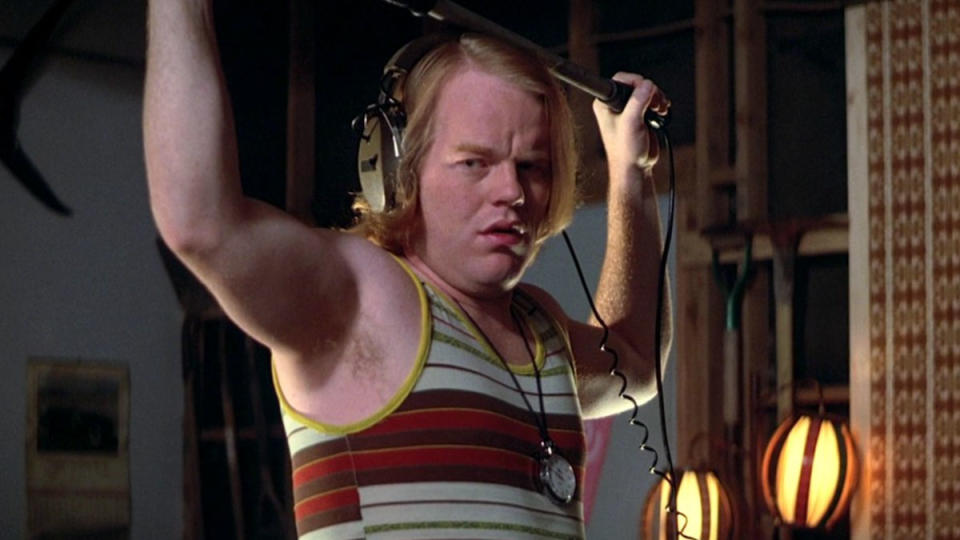
Boogie Nights (New Line)
Hoffman was a perfect fit for the singular worlds constructed by Paul Thomas Anderson. And while he’s not on screen for a large chunk of Boogie Nights, his presence is unforgettable — Scotty the sound guy is the sort of character that’s one-of-a-kind on paper, and utterly forgettable in Hoffman’s hands. Despite Scotty’s eccentricities, there’s a sympathetic quality to him, thanks to Hoffman’s nuance as an actor — where another person’s take on the character might have been more steeped in exaggeration, Hoffman always found undercurrents of humanity. — Mary Siroky
Brandt, The Big Lebowski (1998)
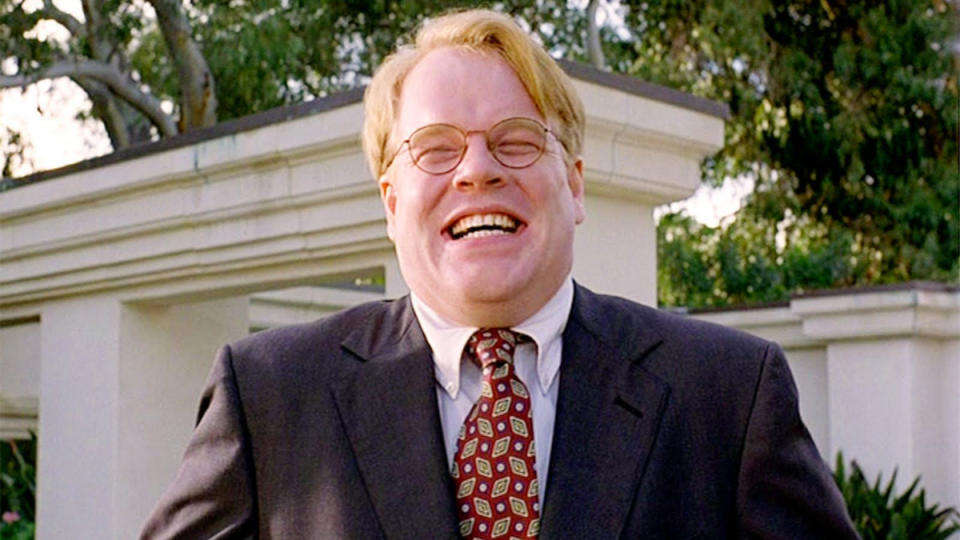
The Big Lebowski (Universal)
Hoffman’s part as Brandt in The Big Lebowski is small — one of the actor’s smallest at barely five minutes of screen time — but as with everything he did, his performance was outsized. As the cloying, obsequious assistant to the Big Lebowski himself, Hoffman turns something that could be annoyingly two-dimensional into something rich and hilarious. The way he guides The Dude through Lebowski’s awards, or sorrowfully leads him into the west wing, or simply the straight-laced way he uses The Dude’s sobriquet — it’s all simply delicious. Small choices in small roles often reveal true talent, and here’s the proof. — Ben Kaye
Phil Parma, Magnolia (1999)
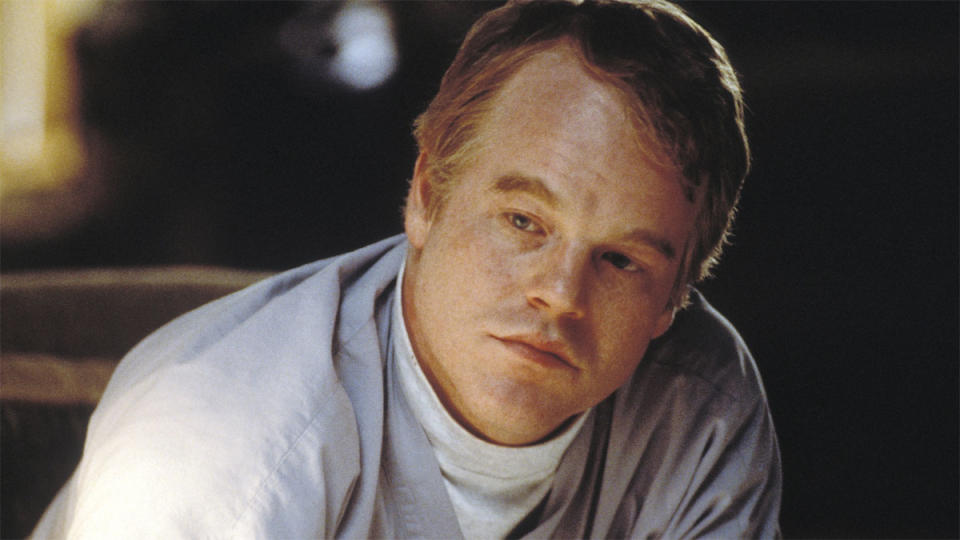
Magnolia (New Line)
Few actors are as well-suited to ensemble casts as Philip Seymour Hoffman was. In a story as knotty and fraught as Magnolia — up against heavyweights including Tom Cruise, William H. Macy, Julianne Moore, and John C. Reilly to boot — he serves as an essential anchor, his brilliance illuminating his co-stars as much as himself. In Paul Thomas Anderson’s 1999 drama, Hoffman stars as Phil Parma, a nurse who cares for a former TV producer who’s dying of cancer — but Phil’s undertaking extends far beyond his patient’s medical demands. He’s arguably the most genuine, well-meaning character in Magnolia, assisting whomever however he can in an emotional epic filled with greed, vanity, and hedonism. Phil doesn’t pretend that he isn’t just as flawed as his peers, and conveys a message that only someone with Hoffman’s prowess could articulate so poignantly: You’ll rarely, if ever, regret giving someone your help. — Abby Jones
Freddie Miles, The Talented Mr. Ripley (1999)
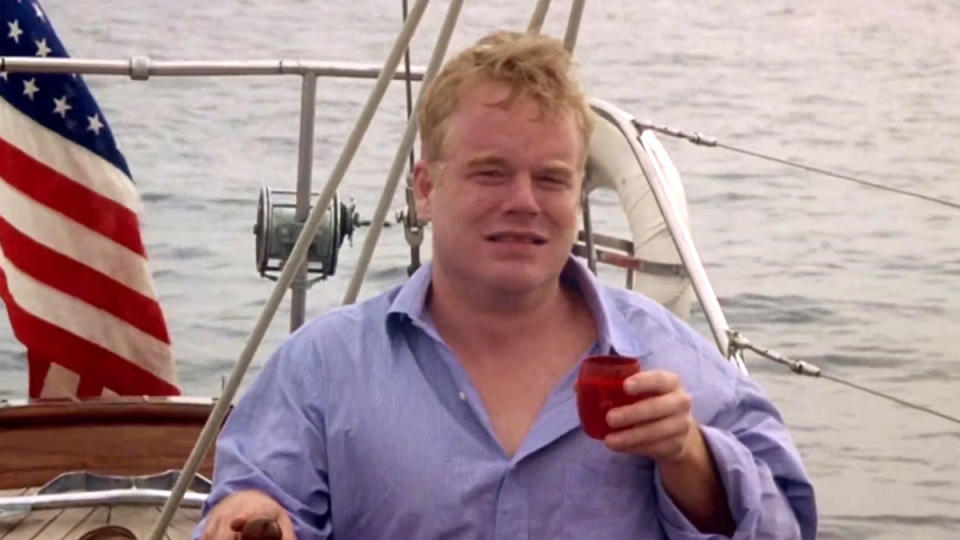
The Talented Mr. Ripley (Paramount)
Philip Seymour Hoffman generally elevated any project he graced. His ability to easily communicate the intricacies and quirks of a character is front and center in The Talented Mr. Ripley, where Hoffman inhabits the role of an entitled, privileged American soaking up the sun abroad. Freddie Miles is quite dislikable, but it’s so much fun watching Hoffman in this space, especially when surrounded by other good actors and immersed in sharp writing. From the moment Freddie’s bright red sports car rolls dramatically into frame, we know things are about to get extremely interesting, and in a film packed with memorable dynamics and strong performances, Hoffman still makes a major mark. — M. Siroky
Joseph Turner White, State and Main (2000)
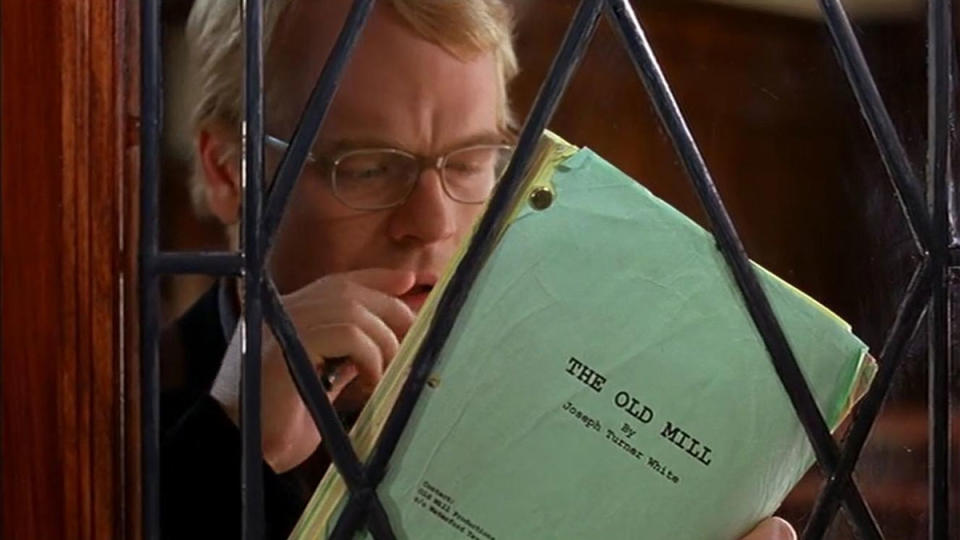
State and Main (Fine Line Features)
For his largely scathing and often hilarious satire of what it’s like to make a major motion picture, writer/director David Mamet cast Hoffman as the hero — which is to say, Hoffman plays the screenwriter of a movie being shot in an idyllic Vermont town, doing his best to preserve his vision as the cruel engine of production rolls forward. It’s possibly Hoffman’s warmest performance, bringing out his most sweet and sincere qualities, especially as his character grows closer with earnest and honest local resident Annie (played by Mamet’s real-life wife, Rebecca Pidgeon). We got so few opportunities to see Hoffman as a lovable romantic lead during his career, making an already special film all the more precious. — L.S. Miller
Lester Bangs, Almost Famous (2000)
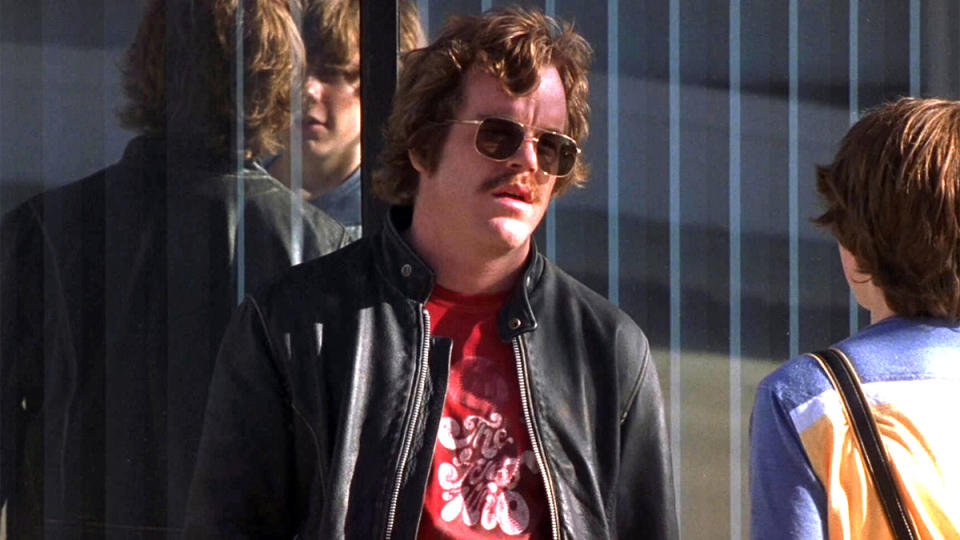
Almost Famous (DreamWorks)
Hoffman was no stranger to transformations, but in Almost Famous, he channeled his jaded inner critic so well that it feels like he wasn’t even playing a character. Assuming the role of real-life rock critic Lester Bangs was no easy task — luckily, Cameron Crowe’s passionate dialogue and grounded attitude made the part a perfect match. Lester is caught between dreading the future and seeing the glass half-full; he sees himself in young William (Patrick Fugit), untouched by the artifice of the entertainment world and caring, more than anything, about “the music.” You can feel Hoffman tow the line between encouraging William to follow his path and urging him to give up on his dreams now to prevent future disappointment. But in acting as William’s voice of wisdom, Lester finds purpose, and most of all, assurance in the idea that every new generation is given the proper tools to truly appreciate great art. — Paolo Ragusa
Dean Trumbell, Punch-Drunk Love (2002)
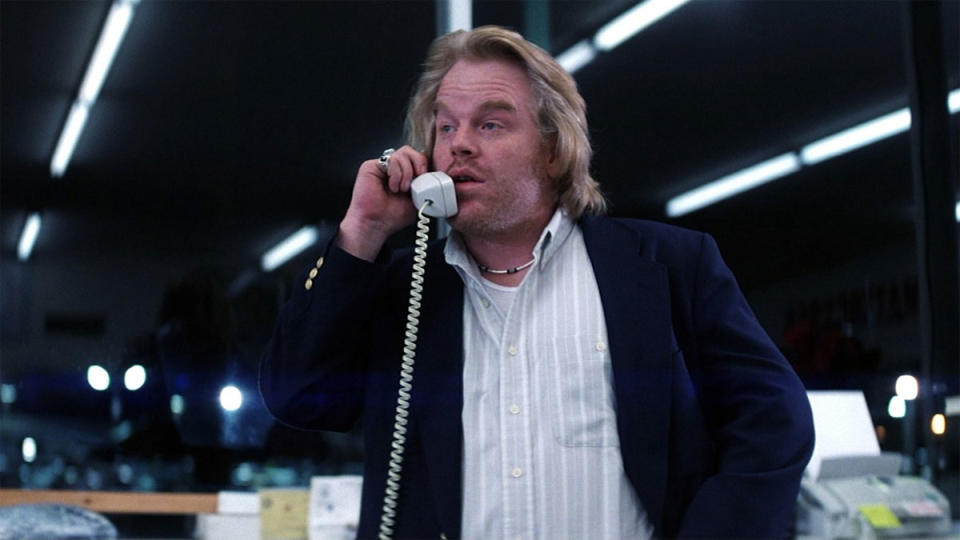
Punch-Drunk Love (Sony)
By all accounts, Philip Seymour Hoffman was a perfectly nice bloke in real life — but man, can he play an asshole like no one else. From the early days of his career as a shit-head rich kid in Scent of a Woman to the fowl-mouthed, mattress-selling conman he portrays in Punch Drunk Love, Hoffman was an expert at capturing hollow confidence. A perfect counterpoint to Adam Sandler’s Barry Egan, his character Dean Trumbell is a toxically masculine peacock: rude, loud, and ultimately cowardly. Though his bite is non-existent, his bark is oh-so entertaining, leading to some of the most iconic line deliveries of Hoffman’s career (“Shut up! Shut the fuck up! Shut up! Will you shut up! Shut up! Shut, shut, shut, shut up! SHUT UP! Now, are you threatening me, dick?”) — Jonah Krueger
Sandy Lyle, Along Came Polly (2004)
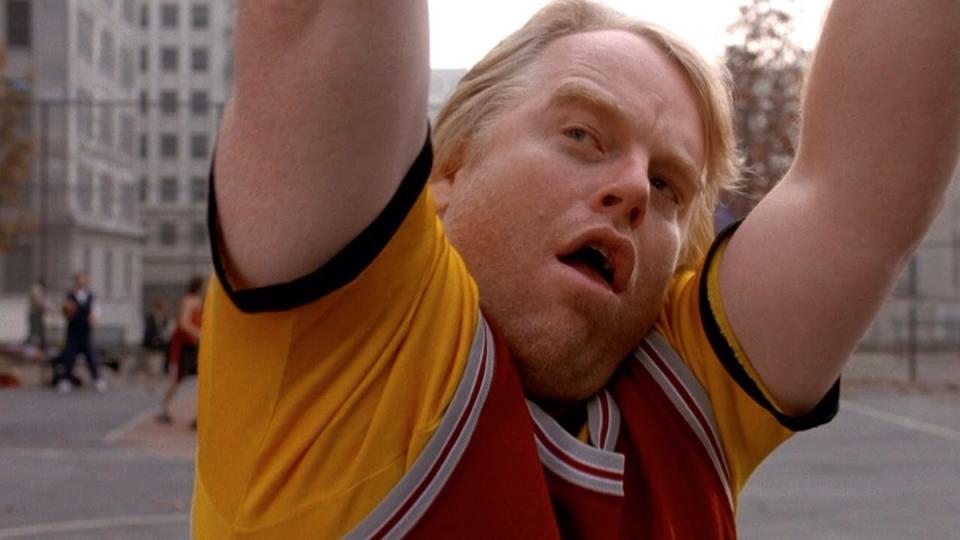
Along Came Polly (Universal)
This early ’00s rom-com is best remembered for Hoffman’s performance, because rarely has a movie’s comic relief been so wildly unhinged. While Hoffman was not the most obvious choice for Sandy Lyle, a former teen idol looking to cash in on his showbiz glory days, he certainly was the most charged: Watching him flail like a buffoon on the basketball court next to a straight-laced Ben Stiller makes it seem like Philip Seymour Hoffman has never played basketball in his life, let alone held a basketball before. Over the course of the film he heightens every Sandy scene to the 10th power, stealing the show so often that Along Came Polly might as well be saved by Hoffman’s haywire enthusiasm. It’s one of the most hilarious roles in his wildly versatile filmography. — P. Ragusa
Truman Capote, Capote (2005)
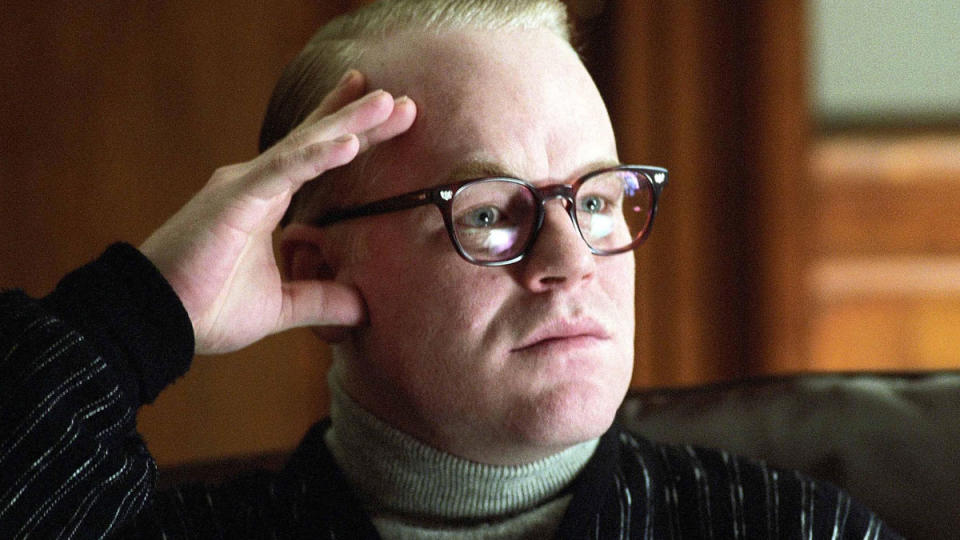
Capote (Sony PIctures Classics)
Many actors have played the famous 20th century writer over the years — Tom Hollander’s rendition in Feud: Capote vs. the Swans just began airing on FX, and even the year Capote premiered, there was a competing project called Infamous (with Toby Jones in the lead). Still, Hoffman received his first Oscar nomination — and won — for his flawless portrayal of Truman Capote during the writing of his masterpiece, In Cold Blood. Big personalities like Capote can be easy to mimic, with the right dialect coach and makeup team, but Hoffman dug into the author’s soul to bring out the ways in which working on the iconic “non-fiction novel” impacted him. — L.S. Miller
Owen Davian, Mission: Impossible III (2006)
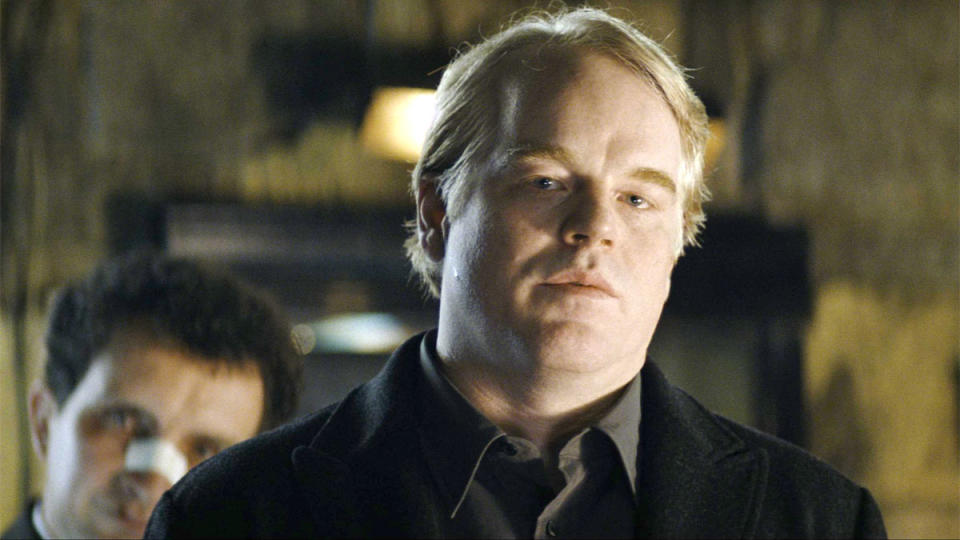
Mission: Impossible III (Paramount)
While Hoffman may be most beloved for his more eccentric roles, he made a very compelling villain when he wanted to do so. His ability to send a chill down the viewer’s spine when speaking in the most level voice imaginable was unrivaled; he played with subtlety and restraint throughout his career, and his work in Mission: Impossible III elevates an entertaining story into something even more heart-pounding. Even when he’s the one tied up and lacking the upper hand, the sense of unease he adds to the story never dissipates. Hoffman also nailed another challenge the film presented: Pretending to be Tom Cruise in a mask, during the film’s standout — M. Siroky
Gust Avrakotos, Charlie Wilson’s War (2007)
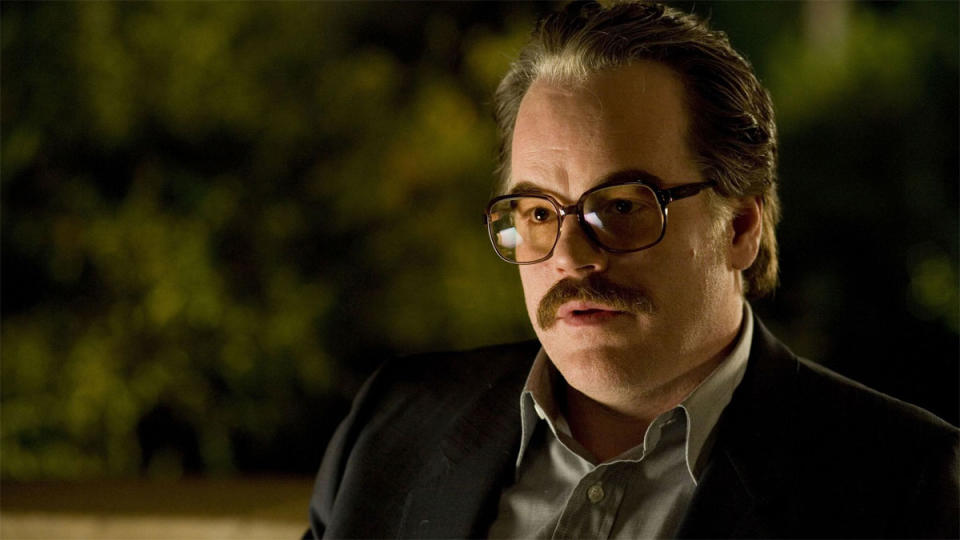
Charlie Wilson’s War (Universal)
Some of film’s finest crafters of dialogue were lucky enough to have Hoffman speak their words on screen, and Aaron Sorkin got the honor twice, the first time being this Mike Nichols-directed political dramedy. And boy, did Hoffman tear into the role of CIA operative Gust Avrakotos. As with Lester Bangs in Almost Famous, Gust serves as something of a mentor to Tom Hanks’ Congressman on a mission to address the Soviet–Afghan War of 1979-1989, and as with Lester Bangs, gets some of the movie’s best dialogue. “I like you just fine, Mrs. Herring, it’s just been my experience that when people with money and too much free time get involved in politics, pretty soon, I forget who it is I’m supposed to be shooting at” was just one of the incredible lines Hoffman savored, in a performance that earned him his second Oscar nomination. — L.S. Miller
Father Flynn, Doubt (2008)
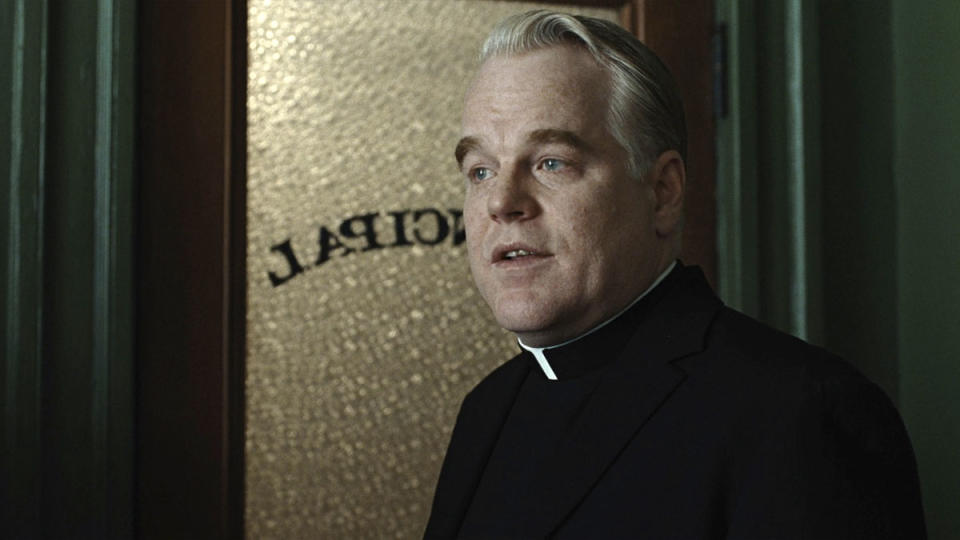
Doubt (Miramax)
Playing a priest suspected of horrific misconduct might be one of Hoffman’s most complex performances, as this adaptation of John Patrick Shanley’s play hinges on not just the other characters, but the audience itself being unsure that Father Flynn is guilty of the accusations brought against him. Beginning the film in pure “I’m not a regular priest, I’m a cool priest” mode, Hoffman then has to run the gamut from moments of gentle compassion to pure self-righteous rage, all while sharing the screen with three of modern cinema’s most formidable actresses: Amy Adams, Viola Davis, and Meryl Streep herself. Going toe-to-toe with a full-throttle Streep isn’t something for the faint of heart, but Hoffman made sure it was a fair fight. — L.S. Miller
Art Howe, Moneyball (2011)
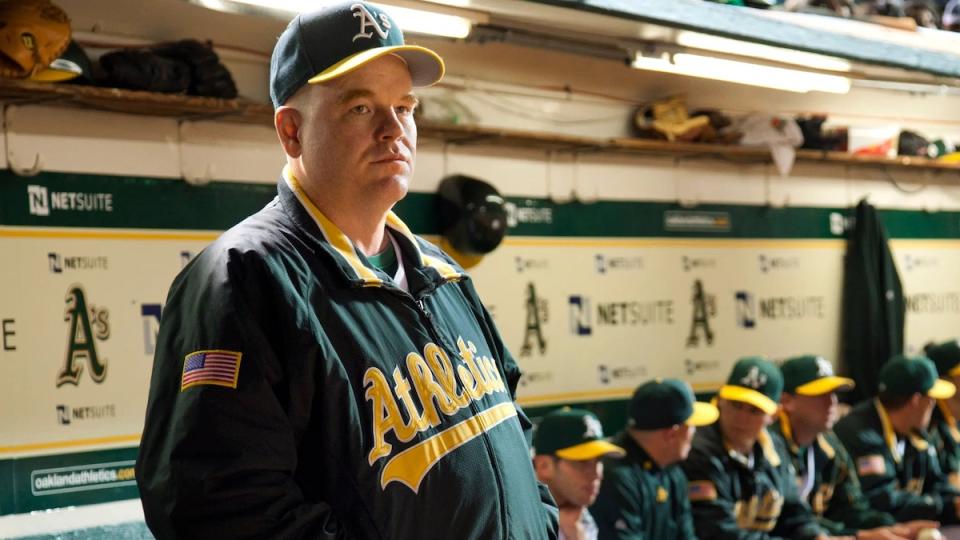
Moneyball (Sony)
Great sports films aren’t just about beating Team Iceland, but what Team Iceland represents. In Moneyball, the antagonist is traditional thinking, a concept embodied by Hoffman’s Coach Art Howe. Whether the actual Howe was truly so intransigent in the face of Billy Bean’s sabermetrics approach is up for debate, but Hoffman’s reserved irritation provide’s Brad Pitt’s Bean a perfect foil. Their scenes together are the definition of “bristle with tension,” the former’s cold adamancy warding off the latter’s attempts at civility. Just watch Hoffman’s face when he learns Peña’s been traded; he’s not doing much as Howe, but he’s doing it all. — B. Kaye
Lancaster Dodd, The Master (2012)
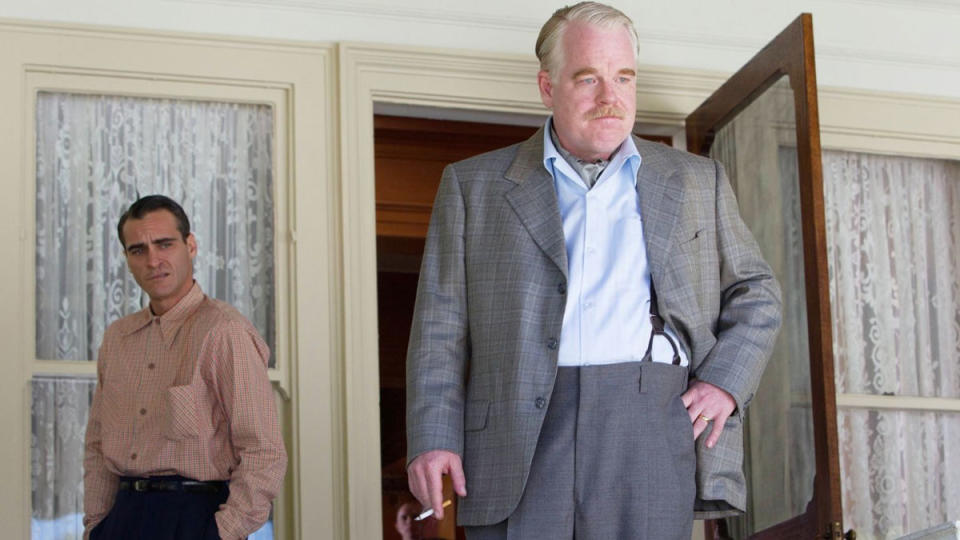
The Master (The Weinstein Company)
Reportedly, Paul Thomas Anderson always had Philip Seymour Hoffman in mind to play The Master’s Lancaster Dodd, and it’s not hard to see why. He’s charismatic enough to pull off the role of a cult leader, but complex enough to hint at Dodd’s hidden anxieties and flaws. Perhaps even more importantly, he’s able to play the calmer, more subdued moments just as perfectly as he can the unhinged breakdowns. In fact, it’s often the more restrained scenes in the films where Hoffman shines the most, like the famous processing scene or his final confrontation with Joaquin Phoenix’s Freddie Quell. Like all great actors, Hoffman doesn’t need an explosive outbreak to light up the screen with fireworks. — J. Krueger
Plutarch Heavensbee, The Hunger Games Franchise (2013)
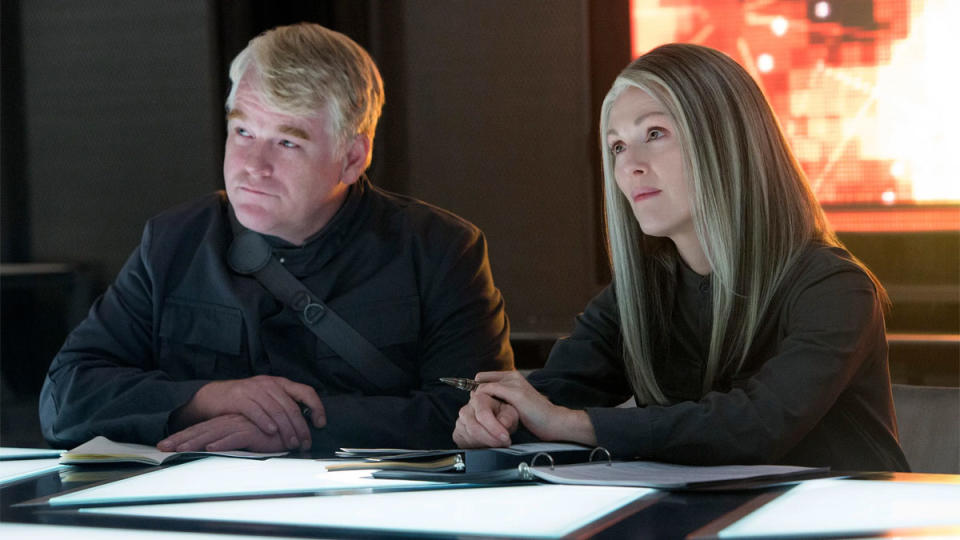
The Hunger Games: Mockingjay — Part 1 (Lionsgate)
Hoffman’s role in The Hunger Games: Catching Fire captures both the difficulty of living in the harsh dystopian world presented by the series, and what it means to work inside the system to bring it down. Initially, Catching Fire depicts Plutarch Heavensbee as a master manipulator, befitting his role as a high-ranking Capital official and Head Gamemaker — something Hoffman captures through the character’s snide, deceptive manner. Of course, this is just a facade, as Plutarch ultimately double-crosses President Snow as part of the rebel fight. As an Oscar-winning actor, Hoffman brought a necessary sense of gravitas to the franchise, though he sadly passed away before production on The Hunger Games: Mockingjay — Part 2 finished. A small amount of “digital trickery” was used to complete his performance, though as director Francis Lawrence told The Guardian in 2015, “I would have liked his role to be larger.” — Venus Rittenberg
Philip Seymour Hoffman’s 15 Best Roles
Consequence Staff
Popular Posts

